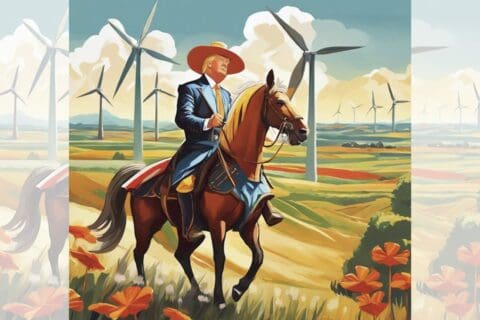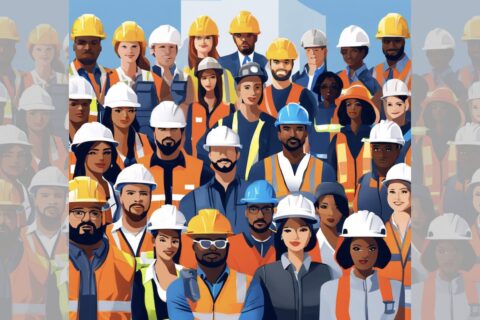
In this SustMeme Guest Post, Marilyn Waite, acclaimed author and Managing Director of the Climate Finance Fund, explores employee influence and explains why green collar jobs are not the only way to have impact.
MW: Corporate sustainability has become a non-negotiable element of employee attraction and retention.
In a survey of 1,600 respondents from 65 different nationalities, the Net Impact Report 2021 found 52% of workers considered leaving their job due to the poor social and environmental impact of their employer.
Increasingly, as Millennials/Gen Y and Gen Z come to dominate the workforce, there’s an expectation that the companies they work for should align with positive social and environmental impact.
And this demographic expects action, not just words.
For the bulk of the global workforce that is Millennial and younger, ‘greenwashing’ and ‘social-washing’ just won’t cut it. So, what does work?
Green collar jobs are not the only answer
Green collar jobs are one answer; anyone active in the green economy — working with clean energy or in the circular economy, for example — has a green collar job.
But sustainability impact opportunities are not limited to traditional green jobs.
As companies increase their efforts to improve their sustainability credentials for risk management, regulatory compliance, customer demand, and innovation reasons, a wider range of roles has emerged.
Some jobs explicitly cover the realm of sustainability, such as environmental engineer or sustainability officer. Others, while not so obvious, also address sustainable development issues and goals, including such as: manufacturer (for renewable energy components), journalist (focusing on sustainability issues), and architect (specialising in zero-impact buildings).
Sustainability is not, however, a one-person or even one-team job; everyone in the organisation has a part to play. How, then, can you make this principle work in practice?
SURF: Supply Chain; User; Relations; Future
One way of doing this is by applying my SURF framework to an organisation.
S: The ‘S’ in SURF stands for supply chain considerations that address sustainability criteria.
Questions to ask of an organisation’s supply chain might include:
- Are suppliers applying good environmental, social, and governance (ESG) practices?
- Are they using non-polluting inputs?
- Are they respecting human rights?
- Do they practise equity and inclusion?
The reality is that, whilst it is relatively easy for many companies to focus on sustainability within their own four walls, they often overlook the same considerations for the whole supply chain.
U: The ‘U’ in SURF stands for user.
The user may be known as a customer, consumer or client. The core question here asks:
- Is the user enabled to use the product or service in a socially and environmentally sustainable way?
For example, is the user provided with a means to reuse or recycle a product?
R: The ‘R’ stands for relations or relationships – both internal and external. Questions include:
- Do stakeholders — such as investors, lenders, employees, customers, and the community — have a say in the decisions that impact them?
- Is the organisation inclusive and transparent?
F: And, finally, the ‘F’ stands for future, and is all about the responsibility that we, as both humans and organisations, have to future generations. Sustainability is all about planning for the future — without it, there will no planet to hand over to our collective offspring.
Employees have influence; and it shows
Applying the SURF framework to a place of work helps employees do two key things:
- Understand whether an employer is acting sustainably; and
- Identify what types of roles could help that employer improve its ESG performance.
Relevant to both current and prospective employees alike, the SURF framework may be something candidates wish to apply before even taking up a role with any organisation.
Whether or not you opt for a role that is directly labelled a ‘green job’ or typically leads to an ‘impact career,’ it is important to remember that employees have influence.
More than a quarter of people live in a country where the working population is shrinking rather than growing, and organisations globally are struggling to fill job vacancies.
This means employees have clout, and more than ever before.
As a consequence, employers today are hearing that employees want their work to be meaningful, do no harm, and preferably leave a positive tangible trace behind for humanity.
Workers want employers to be socially and environmentally responsible — and will vote with their feet.
As showcased by sustainable business leader and Paul Polman, the 2023 Net Positive Employee Barometer survey of 4,000 US and UK employees found at least one-third of respondents resigned from their jobs because they felt their companies’ efforts to tackle environmental and social challenges were insufficient.
So, organisations that want to hire and retain the best talent simply can’t afford to ignore sustainability.
And, change is happening already; the world of work is becoming more sustainable.
In part, this change is thanks to pressure from employees.
CSR, ESG and SDGs
Symptomatic of this trend is the ongoing shift from CSR to ESG.
The concept of Corporate Social Responsibility (CSR) – the idea that businesses have a responsibility to improve society instead of just focusing on their own bottom line – has effectively morphed into Environmental Social & Governance (ESG).
ESG extends the idea of social responsibility to the environment and business practice itself.
In response, many companies are building ESG into their organisational structure, creating policies and practices that benefit local communities and the environment.
Furthermore, virtually all the world’s largest companies now issue a sustainability report, plus many adopt and set targets that align with United Nations Sustainable Development Goals (SDGs).
From the C-Suite to the gig economy
Of course, you don’t have to be a full-time, permanent, salaried employee to have a sustainable career.
From the C-Suite to the gig economy, the SURF framework can be used to build a sustainable foundation for your own organisation as an entrepreneur, a founding partner, a non-exec, a trustee, or a freelancer.
In truth, there’s still a lot of work to do to make good on sustainability goals. But, by focusing on building sustainability into our own careers, together we can make that change happen.

Marilyn Waite is the author of Sustainability at Work: Careers That Make a Difference (Routledge, £36.99) — a compelling guide for anyone who seeks both a successful career and a one that makes a positive difference in society.
Having worked across four continents in low-carbon energy, climate modelling, and investment, Marilyn currently leads the Climate Finance Fund and teaches ESG Strategies at Sciences Po and universities around the globe.
Further Reading:
- More on the Climate Finance Fund, a philanthropic platform that helps mobilise capital;
- More on the findings of the Net Impact Report 2021;
- More from Paul Polman about the 2023 Net Positive Employee Barometer;
- Also on SustMeme, Energy transition to add 40 million jobs by 2050;
- Also on SustMeme, Making a more diverse future for manufacturing;
- Also on SustMeme, Millions of jobs in circular economy for Global South;
- Also on SustMeme, CSR job vacancies up 74%, as companies focus on ESG;
- Also on SustMeme, ESG: ‘Future COO’ in ‘The Times’;
- Also on SustMeme, Time for the Chief Sustainability Officer to step up?
You can check out the full archive of past Guest Blog posts here.
Would you like to Guest Blog for SustMeme? For more info, click here.
SUSTMEME: Get the Susty Story Straight!






